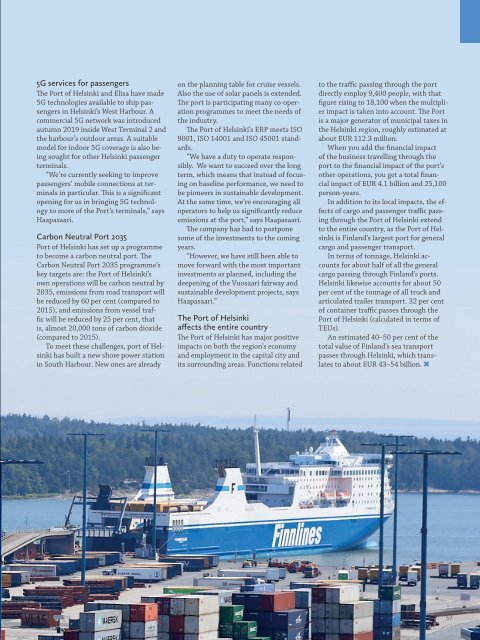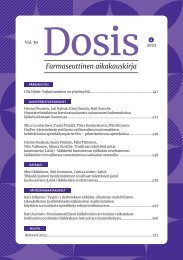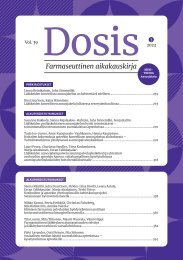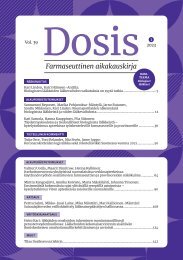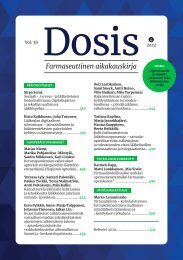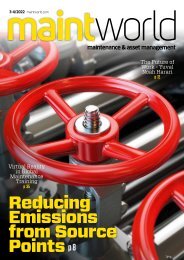You also want an ePaper? Increase the reach of your titles
YUMPU automatically turns print PDFs into web optimized ePapers that Google loves.
5G services for passengers<br />
The Port of Helsinki and Elisa have made<br />
5G technologies available to ship passengers<br />
in Helsinki’s West Harbour. A<br />
commercial 5G network was introduced<br />
autumn 2019 inside West Terminal 2 and<br />
the harbour’s outdoor areas. A suitable<br />
model for indoor 5G coverage is also being<br />
sought for other Helsinki passenger<br />
terminals.<br />
“We’re currently seeking to improve<br />
passengers’ mobile connections at terminals<br />
in particular. This is a significant<br />
opening for us in bringing 5G technology<br />
to more of the Port’s terminals,” says<br />
Haapasaari.<br />
Carbon Neutral Port 2035<br />
Port of Helsinki has set up a programme<br />
to become a carbon neutral port. The<br />
Carbon Neutral Port 2035 programme’s<br />
key targets are: the Port of Helsinki’s<br />
own operations will be carbon neutral by<br />
2035, emissions from road transport will<br />
be reduced by 60 per cent (compared to<br />
2015), and emissions from vessel traffic<br />
will be reduced by 25 per cent, that<br />
is, almost 20,000 tons of carbon dioxide<br />
(compared to 2015).<br />
To meet these challenges, port of Helsinki<br />
has built a new shore power station<br />
in South Harbour. New ones are already<br />
on the planning table for cruise vessels.<br />
Also the use of solar panels is extended.<br />
The port is participating many co-operation<br />
programmes to meet the needs of<br />
the industry.<br />
The Port of Helsinki’s ERP meets ISO<br />
9001, ISO 14001 and ISO 45001 standards.<br />
“We have a duty to operate responsibly.<br />
We want to succeed over the long<br />
term, which means that instead of focusing<br />
on baseline performance, we need to<br />
be pioneers in sustainable development.<br />
At the same time, we’re encouraging all<br />
operators to help us significantly reduce<br />
emissions at the port,” says Haapasaari.<br />
The company has had to postpone<br />
some of the investments to the coming<br />
years.<br />
“However, we have still been able to<br />
move forward with the most important<br />
investments as planned, including the<br />
deepening of the Vuosaari fairway and<br />
sustainable development projects, says<br />
Haapasaari.”<br />
The Port of Helsinki<br />
affects the entire country<br />
The Port of Helsinki has major positive<br />
impacts on both the region’s economy<br />
and employment in the capital city and<br />
its surrounding areas. Functions related<br />
to the traffic passing through the port<br />
directly employ 9,400 people, with that<br />
figure rising to 18,100 when the multiplier<br />
impact is taken into account. The Port<br />
is a major generator of municipal taxes in<br />
the Helsinki region, roughly estimated at<br />
about EUR 112.3 million.<br />
When you add the financial impact<br />
of the business travelling through the<br />
port to the financial impact of the port’s<br />
other operations, you get a total financial<br />
impact of EUR 4.1 billion and 25,100<br />
person-years.<br />
In addition to its local impacts, the effects<br />
of cargo and passenger traffic passing<br />
through the Port of Helsinki extend<br />
to the entire country, as the Port of Helsinki<br />
is Finland’s largest port for general<br />
cargo and passenger transport.<br />
In terms of tonnage, Helsinki accounts<br />
for about half of all the general<br />
cargo passing through Finland’s ports.<br />
Helsinki likewise accounts for about 50<br />
per cent of the tonnage of all truck and<br />
articulated trailer transport. 32 per cent<br />
of container traffic passes through the<br />
Port of Helsinki (calculated in terms of<br />
TEUs).<br />
An estimated 40–50 per cent of the<br />
total value of Finland’s sea transport<br />
passes through Helsinki, which translates<br />
to about EUR 43–54 billion. ✖<br />
57


